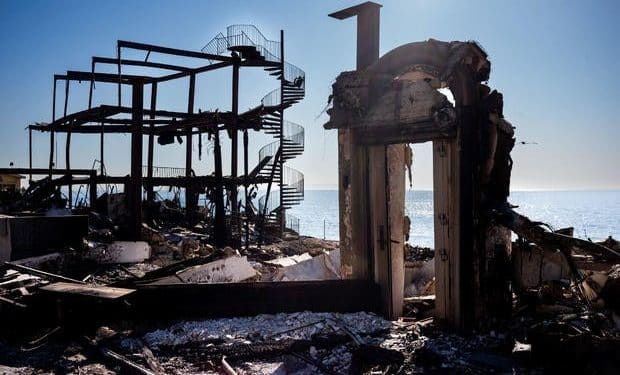Online, there are many accusations that wealthy couple Stewart and Lynda Resnick have hoarded water to fight the Southern California fires. The Resnicks own water rights, but it’s not true that they hoard the water or are hindering efforts to contain the fires. Here’s what we currently know.
Who are the Resnicks?
Stewart and Lynda Renick are the owners of The Wonderful Company. Their portfolio, which was founded in 1979, includes Wonderful Pistachios (an agricultural business that requires water), POM pomegranate, Halo Tangerines, and Fiji Water. The company claims that it is one of the world’s largest food producers and grows most of its products in California.
The Resnicks have received negative press in recent weeks because of their large stake in Kern Water Bank, a 32-square mile underground reservoir located 150 miles away from Los Angeles.
Kern Water Bank is capable of holding nearly 500 billion gallons. The Resnicks hold 57% of those rights. This massive amount of water has fueled anger on social media. Some claim that the Resnicks own 60% of all the water in the State and have accused them of being the reason firefighters lacked water to fight fires. These claims are false.
What are the California water rights?
Water rights in California are owned by a group of municipalities, homeowners, and agricultural interests. The water itself does not belong to the rights holders; rather, they own the legal right to use it. California State Water Resources Control Board clarifies water rights as “a legal permission to use reasonable amounts of water for beneficial purposes such as swimming or fishing, farming, or industry.” Water rights holders can also sell their access to water.
Felicia Marcus, former chair of the California State Water Resources Control Board explains that state constitution contains a “prohibition” against waste and unreasonable usage. If “you ended up in a scenario where someone was withholding large amounts of water,” then the government would be able to step in. In these situations, the government can order water rights holders to reduce their usage, redirect water to other areas with greater needs, and in some cases revoke water rights themselves.
A Wonderful Company spokesperson said that the Kern Water Bank was one of the many sources of water to which the company had rights. The company only tapped into the Kern Water Bank in dry years.
Seth Oster is the chief corporate affairs officer of The Wonderful Company. He told CBS News that the company uses less than 1 percent of the water in the state. They are part of a group of farmers and ranchers, who produce together a quarter of the food produced by the United States. In our case, it’s only healthy food.
What is this all about?
During the wildfire crisis, Los Angeles water supply has not been affected by Resnicks water rights.
Los Angeles County, or the City of Los Angeles itself, could request water from the Kern Water Bank in a severe drought. According to the California Department of Water Resources, the state’s reservoirs that Southern California rely on are all at or above their historical averages.
Marcus told CBS News that the problem in Los Angeles is not due to a lack of water. There are no urban water system that is built to handle this firestorm.
Marcus admits that the water system of the state has problems, including confusion in rules and regulations, difficulty enforcing limitations and a tiered structure which gives greater privileges to senior rights holders.
She said, “There are problems with the California water rights system, and I want to make that clear. They’re not [related] to this fire.”










